Comparing the English Labrador vs. the American Labrador? It’s important to note that in this comparison, the types of Labs we are referring to are the “bench” lab and the “field lab.” They are oftentimes referred to as the “American or English” by people that aren’t involved with the breed. There is only one “labrador” breed, and both the field & bench Labs are bred across the world, but most commonly in the US and the UK.
It’s also important to know that while we can make generalizations based on experience. Every single dog can be different based on their own individual personality. No two dogs are the same, but there are some generalizations we can make about the labrador types based on how they are bred.
The English Labrador is more of a term for show or conformation Labradors. The American Labrador is a term for working Labradors. Ultimately these labels are a result of years of specialized breeding dependent on what purpose you wanted your Labrador to serve.
They differ in their looks. Generally, the English Labrador is shorter and stockier. The American Labrador is taller and more athletic. The English are calmer in their temperament, and the American is much more energetic. Generally, they are similar in every other way.
English vs. American Lab Comparison
English Labrador
- Height 21-25 Inches
- Weight 55-85 Pounds
- Temperament Intelligent, Friendly, Loving
- Energy High Energy
- Health Average
- Grooming Average
American Labrador
- Height 21-25 Inches
- Weight 55-80 Pounds
- Temperament Energetic, Intelligent, Friendly
- Energy Intense
- Health Average
- Grooming Average
English Labrador vs. American Labrador History

To confuse the matter even further, the original Labrador Retriever was neither English nor American and nor was he from Labrador! The Labrador Retriever’s journey began in the 19th century in Newfoundland, Canada, although back then, he was originally called the St. John’s dog.
The St John’s dog was originally bred as a working pooch, primarily for working on the water to collect ducks, fish, and many other small water creatures. He is best known as being the fisherman’s friend with a natural affinity for water.
St John’s dog rose in general popularity when visiting English nobles sailed him back to Great Britain. It was in England that they standardized, refined, and renamed the breed. It is still unknown to this day why he is called Labrador Retriever and not a Newfoundland Retriever. Ever since then, they have become a firm family favorite across the world.
The Canadian fisherman continued breeding him for his work abilities. While the English gentleman was impressed by his work ethic, they were particularly fond of his handsome looks. It is here that the two sub-species were created and why the perfect show Labradors are known as the English Labradors, and the traditional working Labradors are known as the American Labradors.
The Labrador was first recognized by the American Kennel Club (AKC) in 1917, and since then, he has been one of the most popular dogs across the world. The AKC has currently ranked him as the most popular dog in America out of a huge 193 breeds. The Lab has been the reigning champion for 26 years!
Appearance Differences

The English and American Labrador differ slightly in their appearance. Although the official kennel clubs do not recognize the distinction, there is a subtle difference between the two. Both the field and bench variations of the lab typically eschew red-coated pups or silver-coated dogs for competition purposes.
The breed standard as per the AKC, is 21.5 to 24.5 inches tall and 55 and 80 pounds in weight. Females are at the lower end of the spectrum, and males are at the higher end.
The English Labrador is bred purely for show purposes. As such, they are bred to conform to Labrador standards as closely as possible. They have a stockier frame compared to their American cousin, with deep barrel chests and shorter legs. Surprisingly they have thicker fur and a thicker otter tail than the working Americans. English Labradors tend to find themselves on the lower to middle end of the height spectrum. They are also on the higher end of the weight spectrum.
The American Labrador will generally find himself within the above parameters. However, they are not bred for appearance, and on occasion, they may not totally conform to the above standards. The American tends to be slightly taller and slender in appearance. Field Labs find themselves at the higher end of the height spectrum and the lower end of the weight spectrum. He is more muscular and less chunky. He has a thinner coat, with a longer neck and longer muzzle, both of which contribute to his working abilities.
Temperament Differences

The English and the American Labrador may differ in their temperament compared to their looks, and their temperament is normally the deciding factor in regard to which type of Labrador to get if their purpose doesn’t decide it for you.
The Bench Labrador can be calmer in temperament compared to the American. The Field Lab was bred for his working ability and higher energy levels. The Field lab can be a bit bolder than the English, and he enjoys a good challenge, whereas bench labs can be less active and easier to train, depending on your experience levels. The American has more stamina, and, as such, he is harder to tire out.
Both the Bench and Field labs enjoy a good cuddle, and they both make great family pets and are affectionate with their family. Because of their easygoing temperaments, they both love nothing more than to please their master.
Activity Levels

The American Labrador is more active, which means they can seem harder to train because of their energy levels. Our managing editor at this site owned a field lab for 13 years, and she was a puppy until she was four years old. She was always in search of a more exciting task to undertake and would run herself ragged, swimming in the pool for hours on end.
When thinking of which type of lab you’d prefer, it’s important to take energy levels into consideration and make sure that regardless of the bench or field type, you give your pup plenty of outlets to exercise properly.
With all that being said, you have to remember that EVERY dog is different. In general, both the field and bench labs are both amazing family pets, and labradors, in general, are the #1 family dog in the United States for good reason.
Exercise Comparison

The Labrador is a high-energy dog, whether the English Labrador or the American Labrador. They are both originally working breeds. Both will need at least 60 minutes of exercise a day. This is on top of playing in the garden or having a good tug-of-war match with their master. Don’t let their angelic face fool you. If you don’t cater to their exercise needs, they will return the favor in the form of destroying your house and damaging your possessions! A bored dog is a destructive dog, and this is very true of the intensely energetic Labrador.
The English Labrador, due to his show personality, may be slightly less demanding than the American Labrador. Bench Labs are likely to be a bit calmer and less demanding with exercise requirements. The American Lab will have bundles of energy that he will need to expel. If you use him as a working Labrador, then this exercise will suffice. If you don’t, then you’ll need to invest more time exercising him compared to an English Labrador.
As they both have a working background in the water, they love to retrieve sticks or balls from the water, so if you live near a lake or even happen to have one in your garden, this is the perfect way to physically and mentally stimulate their bodies and minds.
Training Differences

The Labrador is the most common breed selected as an assistance dog for the blind and search and rescue dogs, amongst many other canine professions. This is because they are super intelligent and reliable! Labs are on the same intelligence level as a Golden Retriever. If you plan to train them with a harness while walking, make sure you are looking at Harnesses made for Labs, which tend to be more secure.
The American Labrador is said to be a little harder to train than his English counterpart. This is because he is more independent and distracted when it comes to picking up commands and would rather be out fishing and, as such, needs a firmer master. However, they are both very intelligent pooches, and with consistent training, they will pick up commands in no time.
Early socialization is key to ensure that they grow into a well-behaved family addition and that they are also comfortable in a variety of situations with unfamiliar humans and animals alike. Exposing them early on to noises such as moving cars whilst walking on the sidewalk or the hoover in the house is a great way to ensure they are comfortable with everything. Ensuring that every experience is a positive one through positive reinforcement training makes this journey a lot more enjoyable and, of course, quicker for everyone.
Health Comparison
The Labrador Retriever is a generally healthy dog, and as the English and American Labrador are the same breeds, they share the same health problems. It is common for Labradors to develop Hip and Elbow Dysplasia, which is an abnormal formation in the elbow and hip joints, which over time, can cause painful arthritis. This is quite a common health issue in the canine world, particularly in medium to large dogs.
He is also susceptible to vision issues such as Cataracts or Progressive Retinal Atrophy, which is the degeneration of the retina that can cause vision loss over time.
Certain breeds, including the Labrador can suffer from Exercise Induced Collapse, which is characterized by a sudden loss of muscular control following a period of intense exercise. In rare cases, the pup can die immediately, but the average episode can last up to 25 minutes. Symptoms can range from being totally unable to move to drag their limbs behind them whilst they are running.
As with any pup, be sure to research the breed and look out for any important symptoms. If you are in any doubt, then speak to your Veterinarian. The best way to keep your pooch healthy is to keep up to date with all vaccines and attend yearly check-ups.
Nutrition Comparison
The Labrador, on average, will consume 3 cups of food daily. You may have to feed a Field Labrador slightly more if he is out working all day, or maybe slightly less for an English Labrador, depending on his energy levels. This truly varies by dog and activity level, no matter if it’s a bench or a field lab. Either way, both the English Lab and the Bench Lab should be eating dog foods fit for Labradors.
As with any dog, good quality food is an easy way to keep your dog healthy to ensure they get all the best nutrients. In addition, the food should always be age appropriate to avoid unnecessary calories. As your pup ages, it’s likely you’ll want to feed them food that’s rich in Glucosamine or Chondroitin.
The Labrador is also known for being food motivated and borderline obsessed, so make sure that you monitor their snack intake; otherwise, they can easily become a porky pup. Treats are great to reward good behavior or used in puzzle treat toys to keep them mentally stimulated but be sure only to award them in moderation.
Grooming Comparison

The Labrador will need a bath every six weeks or so, which is the same as the average pup. This will be the same for both the English and the American Labrador. Be sure not to bathe him more than every 6 weeks as you risk damaging their natural coat oils, which can cause a multitude of skin issues. If he gets dirty whilst out playing, then you can use doggy wipes and doggy perfume from your local pet store to keep them fresh.
The Labrador’s natural defense against the cold Canadian elements takes the form of a double coat. Their coats act the same way as a wetsuit does, and as such, they shed. The English and the Americans will need brushing once or twice a week. Their undercoats grow thick and dense in the Winter to keep them warm, and then when Spring and Summer arrive, their undercoat sheds. A Labrador living in colder conditions will naturally grow a thicker coat. During shedding season, they will both need to be brushed every other day, if not every day, to keep their fur manageable.
Price Differences

The English and the American Labrador cost, on average, upwards of $1,200 from a reputable breeder. Expect to pay a premium if you are purchasing a bench lab that you plan to use for shows. Show dogs are bred for their parent history and lineage that will provide them with certain traits. As such, they are more expensive.
If you would like a pup who is from a winning bloodline, be that a working bloodline or a bench bloodline, then you can expect to pay a little more, upwards of $2,000. Generally, however, there is no significant difference in the price between the field and bench Labrador. It truly depends on the breeding lines.
Whether you decide to buy a field lab or a bench lab, remember to buy from a reputable breeder. This will help ensure that you have a healthy Lab and not a dog from a puppy mill. Don’t be tempted to save a bit of money on the initial cost. This will undoubtedly cost you thousands of dollars, if not more, on future Veterinarian bills.
There’s always the option to Rescue as well. Our managing editor had a field lab for 13 years. She was adopted at 6 months as a rescue pup. Rescuing can be significantly more cost-effective. But your pup may carry some baggage along that you will likely have to correct.
Frequently Asked Questions
Which breed variant is better for duck hunting?
American or “field” Labradors are better for hunting. While bench Labradors can be excellent hunting companions, field Labs were bred specifically for this purpose. They are slightly leaner and tend to have a little more energy when out in the field.
Which breed variant is easier to train?
They are both equally easy to train. You may have to spend more time and energy training a field lab due to their excitable nature as puppies. Both breed variants are easy to train and pick up on new commands very quickly.
Which one weighs more, the English or the American?
English or “bench” Labradors do end up weighing more. They have slightly thicker builds and will usually weigh a few pounds more than their field counterparts. Weight largely depends on the parents of each dog, so looking at the parents of either type will give you a better idea of what to expect.
Are there any differences in their tails?
There is no significant difference in their tails. They are the same length and girth. Bench Labs may have a slightly thicker tail, but only because it corresponds to their overall thicker build.
Are there any differences in size between them?
There are minimal differences in size. Bench Labs are thicker and may weigh slightly more. Their heads can be thicker and larger. In general, though, both variants are very close to the same size.
Final Thoughts
Overall, when comparing the English Lab vs. the American Lab, they are very similar. They are simply the same breed, with some slight differences. There are slight variations in their appearance and their temperament as one is a show dog, and the other is a hunter. This is not to say that the English Labrador would be useless as a hunter. Nor would we say that the American Labrador is less handsome. Both pups are true Labradors and fantastic family companions.
Regardless if you are looking at a field or bench lab, just realize that it’s the same breed. One type of lab has slightly different energy levels than the other. They are both built slightly differently, but they are the same dog. Pup sizes and personalities can vary by dog. Overall, you can’t go wrong with either one for a family companion. Either way, whatever side of the pond your pooch comes from, you are sure to have a worldwide superstar in your midst.



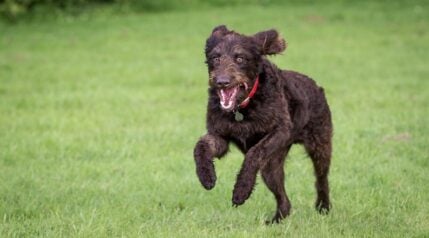

Canadian and American show Labs are stockier than field Labs. Writing an article comparing UK show Labs with American field Labs ends up giving some misconceptions about the breed in the USA.
NORMALLY an Rticle would compare breed types as the difference between SHOW types from one country to another..
Example: North American Sheltiea vs UK line Shelties or American Eng Springers to UK line Eng Springers
But comparing show type from.one country to field type in another country is unfair to both types.
I have had 7 Labrador’s during my life. The best and smartest one I paid $50 for. I owned them all from puppies to the end of their lives. Price does not guarantee a better dog.
Me my dad and my two brothers hunted pheasants with black English Labs for 14 years and we loved the dogs like our children. My dad has passed but my two brothers still own labs. We are all in our seventies. I personally have never owned a lab but my son got an American lab when he was in college and left it with me and my wife for a while. We fell in love with her and called her our grand baby till she passed at 14 years. We still miss her to this day. I am starting to look for a lab now to keep me busy and to love in my later years. Thank You, Ron
Thank you this is a very informative article,I will visit it again
We have had the pleasure to have English labs in our lives for around 20 years. We always opt for dogs,( it’s just the sex of Lab that we were brought up with when we grew up in leafy Cheshire),Every dog is completely different and that makes our lives totally interesting and whole. We even have 2 brothers (from the same litter of course), into our family and they couldn’t be more different in personality. Chocolate is laid back and really can’t be bothered, the other lab that we have in our family is black and his senses are through the roof, he responds to everything before you’ve finished the sentence or command. Poles apart however a unit together.! It’s so clear that they love each other and also us, it’s beautiful to watch them together as they’ve never been apart, so we decided to introduce their great, great grandson into our seemingly growing clan. I stayed in touch with their breeders and we decided that we would add to our family now.The breeders were excellent and still ar, offering advice whenever needed. The breeders kennel name is dolwen labradors and they have been nothing short of outstanding.Its a constant watch with the little one, sometimes a battle and bark from the older two but we wouldn’t change it for the world. Our latest furry bundle is an absolute joy and a credit to the marvellous breeders. Our older two(aged 10), are being brilliant with the pup and tolerating as much as they want to. I really don’t think there is a decision to make about English/American lab apart from if they are going to be more than a pet, then of course think about the role you would like them to play. Otherwise I couldn’t recommend any other beautiful, intelligent, caring, loyal dog and family member. Labradors are a joy every second of every day. They complete our family and world
I have had American or field labs for sixty years. I had one named East Hur Bear that was the most exceptional dog I have ever seen. I think he was a throwback to some original lab. He weighed b/t 130 lbs. to 140 lbs. and was black. He a head as big as a Newfound dog. He also was the smartest dog I have ever seen. I could write a book about how exceptional he was. When he died at the age of fourteen I was in mourning for two years. I always thought that he was smarter than me. I will always miss him.
Patrick Hurley
YES I AGREE.AND UNDERSTAND 100%
Our American Labrador lived to be 16 years old. His diet consisted of only dry dog food and water. He was never given table snacks. Great family dog. The best ball catching dig ever! Very destructive as a pup/ young dog. My wife runs and our lab would run with her at least six miles on a daily basis. Best damn dog ever!
We have a 2 year old female lab that we rescued. I believe that she is an American Lab. We are thinking about getting a lab puppy, and I am interested in tracking and scent work. However, we also need a dog that can settle in the house as a family dog. Would you recommend one over the other?
Most labs make great family pets, no matter which type. Maybe schedule meetings with a few and whomever you fall in love with will be the right fit for your family. All the best!
Show type and field or sporting Labradors are both bred in the UK. They both differ in size. Red Fox and Silver are still not ‘officially’ recognised in the UK.
We didn’t know there was such a thing as an English Lab until one showed up at our door needing a home. He’s been the best dog ever with the most gentle temperament. We would like to rescue another English Lab but can’t find a reputable website that can ensure the dog is of this breed. Does anyone have any advice on how to rescue English Labs?
We’ve had both. We started with American labs (chocolate male, chocolate female, yellow female, black female). The yellow and black females were the most natural retrievers-they just loved to work! Our black female, Sophia, didn’t really slow down or even fill out until she was about 8-9 years old. She passed last year at almost 13 1/2 and we got our two English boys in January. Their first birthday is tomorrow, so the jury is still out on what their energy level will end up being like! They have both learned to retrieve really well, but in the hotter weather they definitely tire faster than the American labs. I do think that they will end up being lower energy than the American labs we had-but the one thing that is a definite trait in all of them is their love of food and people! They are the lovebugs of the dog world!
The day my husband and I returned from our honeymoon, we adopted a 2 year old male yellow lab. My husband is a hunter, and needed a companion, the male lab was a handful. Next came a black American female lab, then a yellow American female lab, then an English yellow female lab, now an American yellow female. Having said that, my English yellow had my heart. It was the hardest when she pasted. I don’t necessarily feel the difference is in American or English, for us it was the difference between male and female. For us the females tended to be better in the field, calmer and much better with the children. We will be looking for another English yellow female pup soon (our lab is 9) I love how stocky and squared off they are.
Thanks alot for the information. It will help me alot to choose for an appropriate Lab for me..
I’ve had bench labs all my life. All were great hunting dogs. Better at breaking the ice in cold weather hunting.
Ok we are all sitting here knowing she’s a field lab but my husband says she is a kitchen lab.
Both sound good but I must say it’s still hard to choose one or the other. In the long run, I will be needing a guide dog, as much I hate, well not really, I’ll need a dog to guide me in some areas. I have noticed in some cases, I don’t have the right eye sight, which makes me feel a bit lost and that’s where a guide dog could help. Plus I’d love the company. Vanessa Kathryn Stallwood
We just lost our English (bench) Chocolate Lab about two months ago. We were blessed to have 15.5 wonderful years to make memories with our Hershey and would not change a thing. I knew there were two different variants, but it was seeing my brother-in-law’s American (field) Yellow Lab next to my lab that really made me realize the differences. They are wonderful family pets and will steal your heart for a lifetime!
Sorry for your loss Candee. Thank you for taking the time to comment, and hopefully, you can find a new pup to help fill the void when the time is right.
Hi, Quick Question!
Growing up we had a bench lab. He was fantastic, lived to be well into his twenties. It wasn’t until today that I found out there were two different ‘types’. Our neighbors and the hunting dogs that my brother-in-law helped trained were totally different than our dog. Not to say ours wasn’t able to retrieve, but he was just as happy sleeping on the deck or sitting in the boat fishing.
Now the question. Does either ‘branch’ of Lab have a greater chance of having the POMC gene mutation?
I knew the hunting dogs would eat but they also burned way more calories. Our Bench Lab at home… well HE LIKED TO EAT. Once stole a whole cooked turkey off a counter! He had energy and could keep up with the other dogs but, just loved to eat.
Hi Rin! Thanks for stopping by to comment. I don’t believe any official studies have been done to differentiate which type of Lab is at greater risk of having the POMC gene mutation. For what it’s worth, we owned a field Labrador for 13 years. And we really had to moderate her food intake.
She loved to eat too, and we had to pull back her food intake as she grew older and was less active. I’d personally lean towards saying that it can affect both equally, but I don’t have any statistical data to back that up. Hope this helps!
My daughter has an American chocolate who couldn’t be sweeter and more loving. Now, if we could figure out a way to harness her energy, we could save the world. Non-stop! Loves everyone and everyone loves her.
I have an English chocolate and I can honestly way that she is an angel! If she isn’t allowed into Heaven, I’m not going. Only two months separate these two and they act like sisters. They adore each other and watching them play quite literally makes my day.
Labs are the best.
Sounds like you have great pups! Thanks for stopping by to comment and share your experience!
Hi! I have a question. Can I take my lab to the beach 3 times a week? Would that affect his coat in a negative way, causing him skin issues? Thanks!
Hi Karen, I think it depends on your pup. The saltwater can dry out their skin. So you may deal with dry skin. You’d likely be fine if you stick with a shampoo that helps lock in moisture. Good luck with your beach-loving pup!
Thanks for the great comparison information on the English and American labrador. Looking to make an important decision on a labrador family pet!
Thanks for the comment Raul! We had a field lab for 13 years and loved her. Good Luck!
Hi there, thank you for the great comparison. If I may, I have a quick question. My boyfriend is from Denmark and here they keep talking about “Formula 1” Labradors. Supposed to be good for hunting and smaller than the “classic” labradors.
I can never find anything about that on international/American websites! Can you explain if maybe that’s just the “American” lab or is there like a 3rd type of lab?? Thanks a lot for your time & efforts have a great day!
Hi Malia! An F1 dog is a designer dog term. It’s used when discussing Hybrid pups, and means that one of the parent breeds is a purebred dog. I don’t think the F1 designation would apply here, as American and English Labradors are very slight variations of the same breed. American labs are “field” and English labs are “bench” which means one is bred more for activity (hunting, outdoor fieldwork) and the other is bred to show in the ring. Hope this helps and good luck!